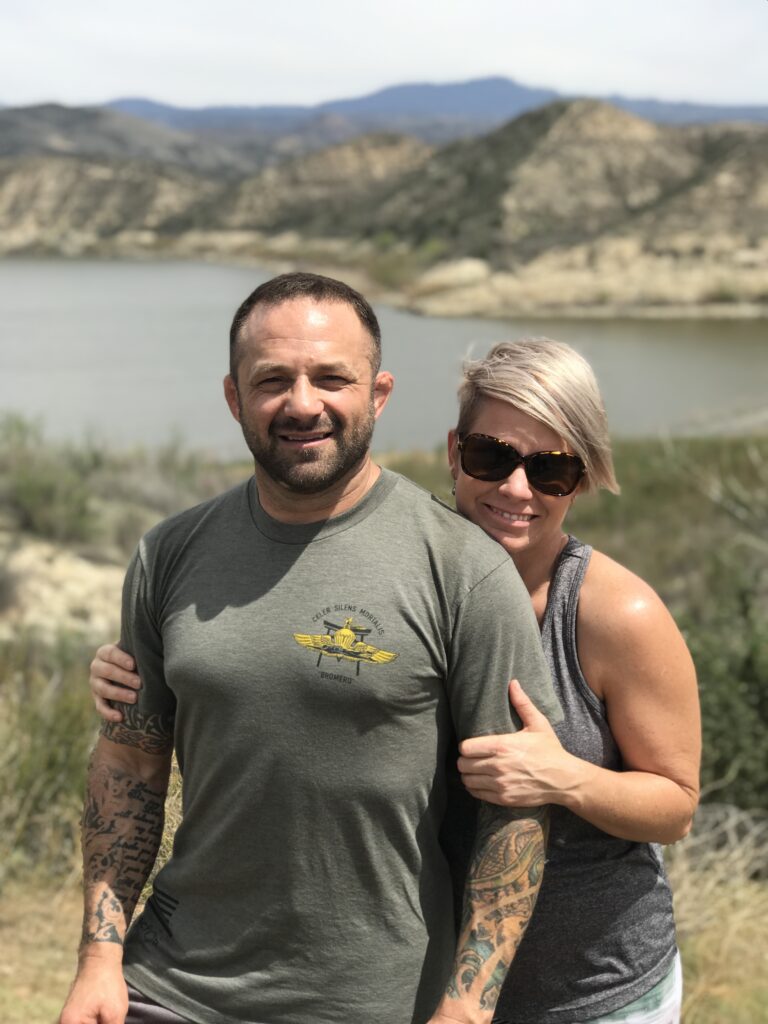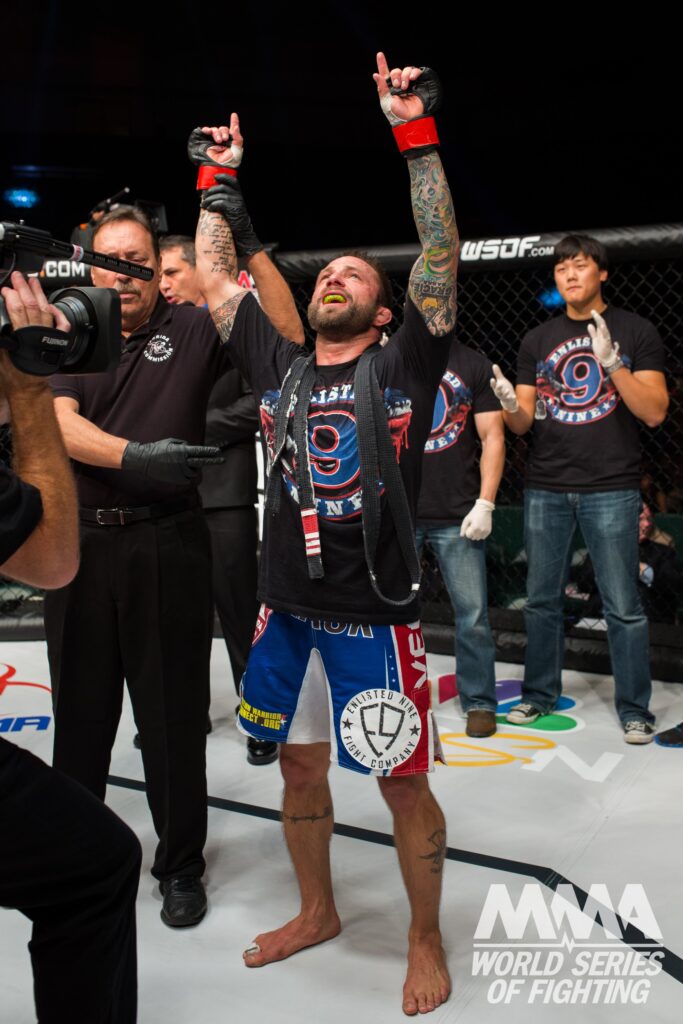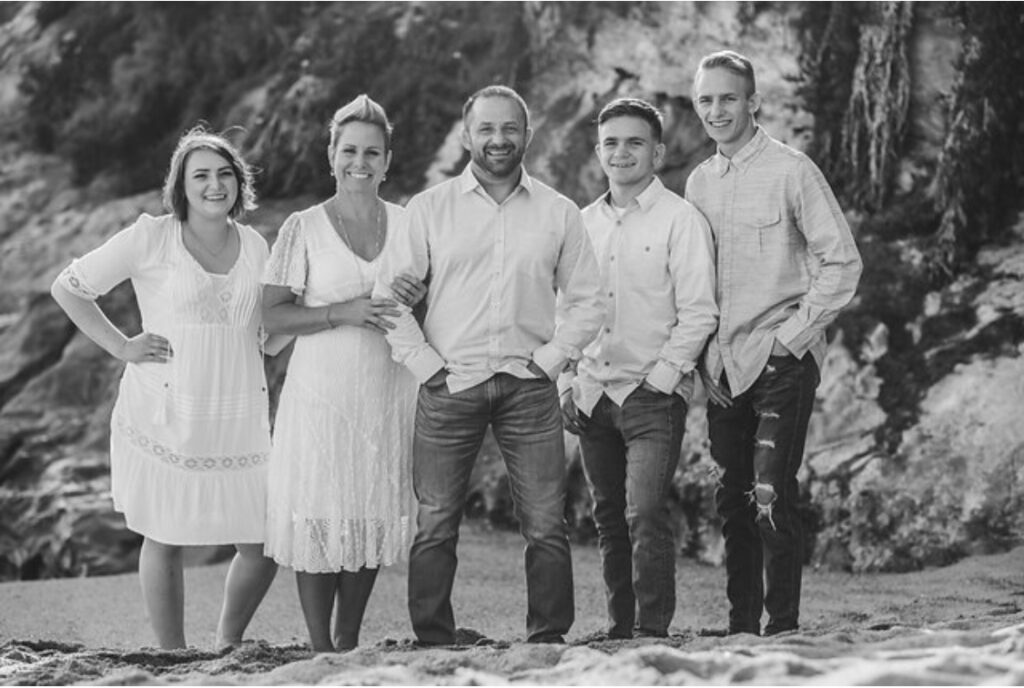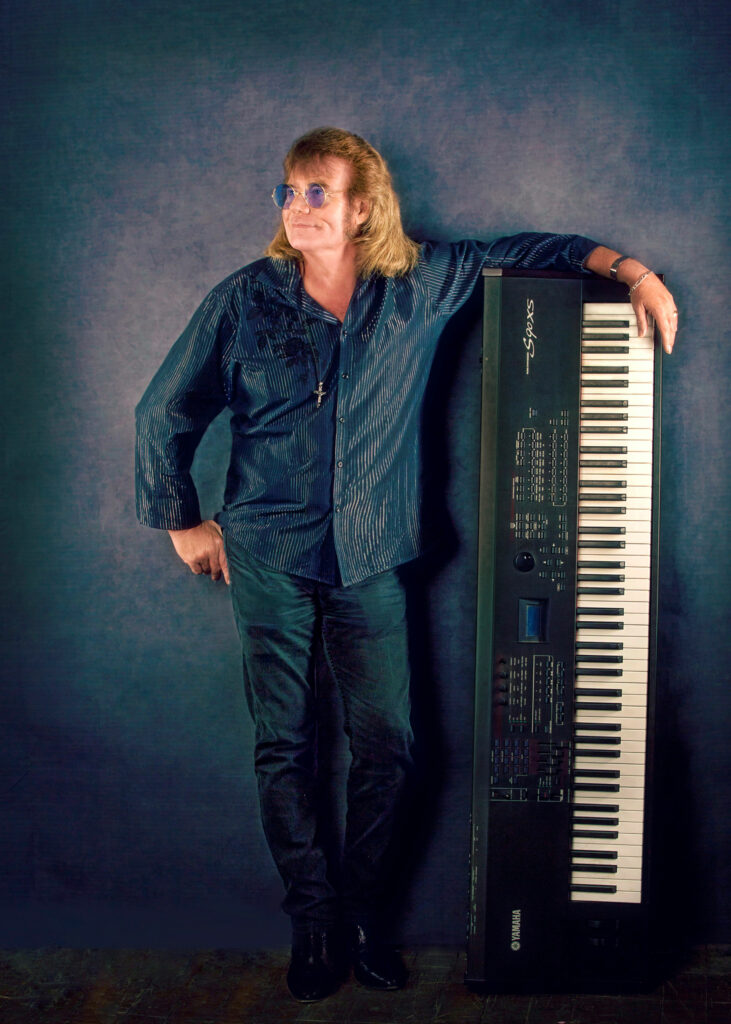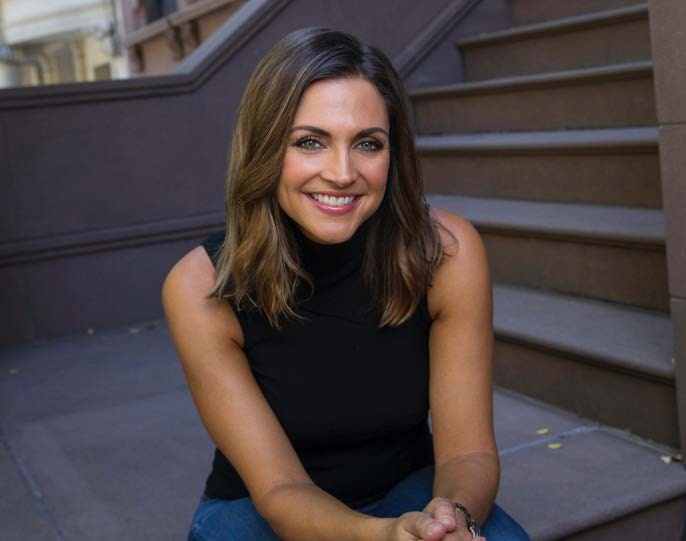Braving Our Way to a Better Life: Chad Robichaux and Tim Atwood
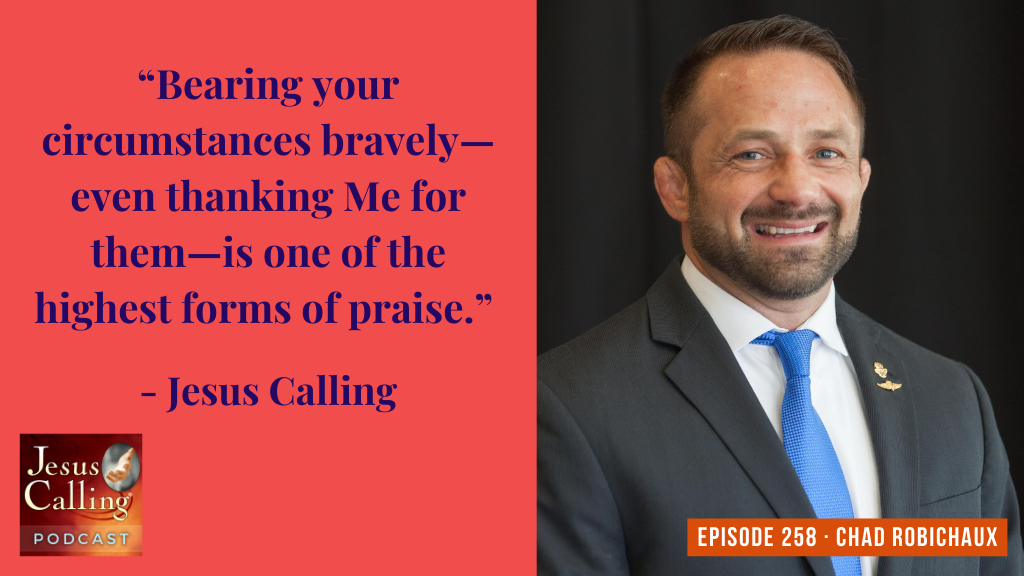
Chad Robichaux: All these things that happened to me in my life—my childhood, Afghanistan, losing buddies—all this stuff, as bad as they were, those things did not lead me to be in a closet with my pistol, man. What led me there were the choices that made response to those things. I didn’t have to let my past define my future. I could choose a different future moving forward. I had a biblical blueprint of how to respond. And so I started being very intentional about saying, “Okay, how am I going to respond to this differently moving forward? What’s the Bible say about it?”
Braving Our Way to a Better Life: Chad Robichaux and Tim Atwood – Episode #258
Narrator: Welcome to the Jesus Calling Podcast. At this time of year, as we celebrate the brave men and women who fought for the freedom of our country, it’s a good time to reflect on what it actually means to be brave. Sometimes, as in the case of our military heroes, bravery means laying down your life for the greater good, or for fellow humanity. Sometimes bravery can mean stepping into something new, apart from everything you’ve known before, to pursue something greater for your life. And sometimes bravery is the simple act of pushing through something hard, or something painful, in order to climb out of the darkness to step back into the light.
Our guests this week have each shown acts of bravery in their lives—one in service to our country as a Marine, and in his own personal battle with PTSD, and another who faced addiction and fights each day not to be pulled back into its grip. We’re talking with Chad Robichaux, a former Force RECON Marine who served in Afghanistan, and Tim Atwood, a touring musician who has shared the stage with some of the country’s biggest legends.
First up, let’s hear Chad’s story.

Chad: My name is Chad Robichaux, I’ve been married to Kathy for twenty-five years now, and I have three children: Hunter, Hayley, and Hayden. My sons, both my sons, followed myself and my father’s footsteps being third-generation Marines. So my father served as a Marine in Vietnam. I served as a Force RECON Marine, I had eight deployments to Afghanistan.
A Second Chance in the Marines
My father, serving as a Marine in Vietnam, came home and struggled with a lot of the same things many of our military warriors face today. He was a very physically abusive man, lots of alcohol. And when he would drink, particularly, he would get very physically abusive, just a really hot temper. And so my childhood, that was kind of a normal life of dealing with a very angry dad, walking around on eggshells, staying out of the house as much as possible. And I had a brother who’s a year older than me, and the two of us really bonded through that.
I think when we were thirteen and fourteen years old, we decided to join the military ourselves to kind of escape the lifestyle, like it was a way out, we saw it as a way out for us. And there was just something about my dad, as broken of a person as my dad was, he would always light up and this joy would come over him with anything that had to do with the Marines. The fact that he is a United States Marine was the one thing that he had in his life. And so that gave me a real appeal towards the Marines.
And so me and my brother, we started researching that. Again, we were very young and we started preparing ourselves. We started running together. We were swimming. We were training for about a year doing that. We already did martial arts together but we started physically working out together. And about a year into that tragedy [hit] our family, my brother was shot and he was killed. And so it was devastating for me. When he died, I went into a very deep isolation.
And so something led me to go to the Marine Corps recruiter’s office. And I remember meeting a man named Staff Sergeant Brown, I still remember his name, and telling him, just really pleading my case. “I want to go in the Marines. This is my childhood dream. This is me and my brother’s plan.” And he helped me get in the Marine Corps without even a high school diploma. And so I’ll be forever grateful for the Marine Corps for giving me that second chance, a clean slate of life and to escape that childhood that I was in and have a chance to build a life.
“I’ll be forever grateful for the Marine Corps for giving me that second chance, a clean slate of life and to escape that childhood that I was in and have a chance to build a life.” – Chad Robichaux
Military Skills Teach Life Disciplines
There are lots of great jobs in the military. But for me, I don’t think there’s a better fit than working in special operations as a RECON Marine. I love the mission, I love the job. All the skill sets that I learned early on, the physical challenges, academic challenges, all the challenges to become a Marine just really helped develop me as a very young man. And so I love that career.
What I really learned in my life and my story is it comes down to one thing: it comes down to a choice. We have to choose if we stay on the X in our life and die either literally, metaphorically, or are we going to get off that X and move forward.
I believe the most effective choices are the ones that we make in advance and that we stick to when times get tough. We don’t decide in those moments: we react, we find ourselves in situations, be it depression and anxiety, the loss of a job like all these different things that we face in life, we find ourselves in a situation. And then in that moment, that moment of chaos, we try to decide what to do. And I believe the right thing to do—just like we do in training in the military—is to think of every possible scenario that could happen on the battlefield. We’re trained for that scenario that when it presents itself, it doesn’t surprise us. If we can look at life and look at the hardships of this world, to look at other broken people—because we’re all broken people in this world—if we look at other broken people and we come to learn lessons from the things we may face and think, What would I do in that situation?, we prepare ourselves. And in the Bible, what I discovered is the Bible has a very clear blueprint on how to navigate each and every situation.
“What I discovered is the Bible has a very clear blueprint on how to navigate each and every situation.” – Chad Robichaux
A Battle With PTSD
A few years later, I found myself diagnosed with PTSD, dealing with anxiety, depression, hopelessness. And the difference this time is that I didn’t follow a series of rules. I chose to stay there for a period of almost three years and it almost cost me everything. For me, I think it began as uncontrolled anger and frustration that really manifested in the way that I took out my family because I was really intense in Afghanistan and all the people I worked with were very intense.
To be honest with you, I was really out of control. I would come home and throw temper tantrums and punch holes in the wall and slam doors and break things and scream at my wife and children. And then when they would call me on it, I’d justify it, be like “I have to be this way right now, I have this important job to do and it requires me to be this way. I can’t change, I can’t be like who you guys want me to be.” And so I feel like I couldn’t come home and flip that switch and be a husband and father. But I started having moments where I was just crossing the line.
My arms would go numb. My face would go numb, I thought my throat was swelling shut, and I couldn’t breathe. And, you know, like this overwhelming anxiety, where physiologically I felt like my body was shutting down, and felt like I had a thousand-pound weight on my chest. And I didn’t ask for help or say anything for a couple of reasons. One, I thought from a peer-to-peer level, if I told my buddies what I was dealing with, they would think I was weak. And two, I had a top-secret SCI clearance. And I knew if I went to mental health, to see a counselor or something, that would jeopardize my clearance to be able to do my job. So I just said, “This is going to pass. I can push it down. I’ll get past this. I’m tougher than this and I can deal with it later.” And those symptoms only got worse.
It started getting worse and worse and it was one moment towards the latter part of my time that we had several team members that were compromised, captured, killed. And I was hanging on by a thread during that time. I think that thread was broken, and really began to go off the rails. My last operation that I went on during the last deployment was two weeks long. And I realized I made some errors and mistakes in the way I was operating, and I realized I put some other people in danger. I was okay that I put myself in danger at that point, but I was worried that I put some other people in danger as well. And that was enough to say, “Hey, I’m not well, I need to let somebody know.” And I was brought home and I was put before a clinical psychologist. My wife was there with me, and I was diagnosed with severe chronic PTSD. And I was devastated.
You just feel like you can’t bear it anymore. Like that was the level of panic I was in all the time. The medicine made me feel like a zombie. So I don’t want to take the medicine. I just felt unescapable. I felt like I failed. So I was extremely ashamed. Like among my peers, for myself, my family, I felt like I let everybody down. But it was a catastrophic rock bottom point of my life, you know, after the diagnosis of PTSD, that led me on about a three year downward spiral.
During that time, I really dove into martial arts as a professional fighter and won a world championship, ranked number six in the world as a flyweight. And so on the surface, everything looked really good. But I was spiraling personally. But I was still dealing with panic attacks. I was still dealing with a lot of anger issues in my life. And my marriage was falling apart.
“During that time, I really dove into martial arts as a professional fighter and won a world championship, ranked number six in the world as a flyweight. And so on the surface, everything looked really good. But I was spiraling personally. But I was still dealing with panic attacks. I was still dealing with a lot of anger issues in my life. And my marriage was falling apart.” – Chad Robichaux
And meanwhile, I had this big fight on Showtime, on Strike Force, and I’m fighting at the Toyota Center in front of 10,00 people. And I’m spending three months preparing for that fight and that whole three months really just neglecting my family, the separation, kind of moving in my own direction. They announce my name and I win the fight and the referee holds my hand up. And all this weight comes off and I’m so excited. And there’s like 10,000 people cheering in the Toyota Center.
Then there was the weirdest thing, it was like time kind of stopped and in my mind, it got quiet. And I remember thinking, like, of all those 10,000 people cheering, not one of them was Kathy, my wife, and she had been to all my fights before. And it was just like this weird feeling of knowing that she wasn’t there.
I started to think of all these things. I was finally like, there was nothing ahead of me. There was nothing in front of me. The fight was over and there was nothing. When I say nothing in front of me, like, you know, there’s nothing left of my family and all the life, kids to go home to. And so I’m like laying there thinking and I’m thinking of all the people that I blame for everything. And I came to this conclusion that the common denominator was me. I was the problem. And, you know, I decided I was going to take my life and I had in my closet, in my apartment, I would put my family pictures on the floor around me and a GLOCK 22 pistol, which is a .40 caliber pistol.
But I believe this is a God intervention thing, that every time I put a gun to my head and tried to build up the courage to pull the trigger, every time I touched my head, I would have this vision that would come over me of like, How is going to play out?
One morning my wife came to my apartment. She knocked on the door, and I’m in that closet with my pistol. I went to the door and I was really irritated with her and we started yelling and arguing. And in the middle of that argument, she asked me a question that radically changed my life and saved my life. She asked me how I could do everything I did in the Marine Corps—we met when we were seventeen and eighteen, so she saw me become a RECON Marine, training schools, like how much discipline it took, like studying and all this stuff. She’s like, “How could you do all of that, and when it comes to your family, you quit?” And she was absolutely right.
So I made a very radical decision at that moment that I was going to fix things and put things back together with the same work ethic and stuff that she was talking about. It had nothing to do with faith at that moment. But one thing I knew is I couldn’t do it alone and I couldn’t do it with the people that I had surrounded myself by. And so I needed some accountability. I had pushed all accountability out of my life. And honestly, at that point in my life, I tried everything. I had been on medication. I’ve been through counseling and programs. I even had professional success in my life and financial success and all these things in my life. Some of those things are good, some of those things bad. But none of them changed my situation. And I’m kind of like an all-in or all-out person. And so I said, “If I’m going to try it, I’m going to try it all.”
And so I surrendered my life to Christ. I began to find restoration in my marriage and my relationship, in my own brokenness, and the PTSD. And so I was able to get hold of my life again. So I found restoration. I found hope again for the first time in a very long time.
“I surrendered my life to Christ. I began to find restoration in my marriage and my relationship, in my own brokenness, and the PTSD. And so I was able to get hold of my life again. So I found restoration. I found hope again for the first time in a very long time.” – Chad Robichaux
Mighty Oaks Foundation
I believe God put a burden on my heart to share that process, the very simple process the Bible gives us, with others, because I knew that I wasn’t the only one struggling. And so that began to manifest in the founding of the Mighty Oaks Foundation, which was simply a pay-it-forward effort to other veterans like me who are dealing with the same things. I’m actually able to not only just step off the rest of my life, but step into the very life that I believe I was created to live and to share with others the way forward.
I’ve spoken to 150,000 active duty troops on resiliency, so really trying to bring down a stigma, letting people know that it’s important to ask for help. If you do it early enough, you know, talk about it earlier, maybe we could have made some adjustments.
We serve military warriors dealing with things like veterans suicide, which has a suicide rate of still over twenty a day, post-traumatic stress, divorce, many issues that our military warriors face. We serve them through a series of programs on resiliency, recovery, and marriage restoration programs as well.
And so if we could give the resiliency principles, let people know that these pillars of resilience of our mind, body, spirit, social, being mentally tough, physically tough, you have a strong spiritual foundation, having the right social network of people around you. If you had all these pillars established in your life, you have those pre-decisions, like I mentioned earlier, to make the right choices when the situation happens, if you kind of look at all those things in advance, you prepare yourself. You could be more resilient, be more combat ready, be more useful to the military and be more resilient to bounce back for yourself and your family, you know, so a lot of that preemptiveness has really helped with the stigma because it’s making guys more comfortable to, “Okay, let me make those adjustments on the front end.”
And realizing that my job in ministry is separate from my personal devotional time with God, and devotionals like Jesus Calling, which is obviously a great one, and having something every day, regimented to have that time to unplug from this crazy world, and spend that special time with God to understand who understand more who He is—we’ll never understand in this lifetime who God is. But the more we know who He is, I think the closer we can understand who He created us to be and find our purpose.
We really have to seek our purpose to find out what His purpose is. And I think when we find that we find a role in His purpose, that’s when we find our contentment, our joy, and then we are able to tap into everything we’re created for.
“We really have to seek our purpose to find out what His purpose is. And I think when we find that we find a role in His purpose, that’s when we find our contentment, our joy, and then we are able to tap into everything we’re created for.” – Chad Robichaux
Narrator: To learn more about Chad and the Mighty Oaks Foundation, please visit www.mightyoaksprograms.org. If you or someone you love is having thoughts about suicide, please call the National Suicide Prevention Lifeline at 800-273-8255.
Stay tuned to Tim Atwood’s story after a brief message.
Jesus Calling Armed Forces Edition
The Jesus Calling team is grateful to the men and women who put themselves on the frontlines every day, keeping our country safe and standing strong to protect our freedoms. To honor that courage and resilience during a particularly difficult season, a special devotional book has been created using passages from the beloved bestselling devotionals Jesus Calling and Jesus Always. This one-of-a-kind edition made especially for the armed forces includes scripture, personal reflections, inspirational quotes, the U.S. Army’s Mission Statement, U.S. Navy facts, and U.S. Coast Guard facts. Celebrate and encourage the heroes in your life with the Jesus Calling armed forces edition, now available exclusively at christianbook.com.
Narrator: Our next guest is musician Tim Atwood, who toured with country legends like Mel Street, Lynn Anderson, and Jim Ed Brown before finding a place with the Grand Ole Opry’s staff band. Tim shares a little about his career, and how he’s remained grounded in faith all these years, as well as a particularly moving experience he had at once of his concerts that reminded him of the importance of honoring our fallen heroes.
Tim Atwood: My name is Tim Atwood, and I played piano in the Grand Ole Opry for thirty-eight years. I moved to Nashville in 1976 and two weeks after I was here I was working with a country artist named Mel Street, and then I worked for Jim Ed Brown Brown and Helen Cornelius from ‘76 to ‘79, and then I worked for Lynn Anderson for a short while. But then I started playing piano at the Grand Ole Opry, in the staff band, and now I’m making the leap to center stage.
Growing Up Years
I actually grew up in Peoria, Illinois. Both of my folks are from the South. My mom was from Tennessee and my dad was from Mississippi and my grandfather in Mississippi was a Baptist minister. And the whole family plays music by ear. Nobody reads music in my family. I had an uncle that sang with the Florida Boys Quartet, Tommy Atwood. And that’s when I first realized you could make a living playing music. And I went, “That’s what I want to do. “
My Granny Atwood was a godly woman, and when I spent summers with her, we’d go to the old-time, all-day singings and dinner on the ground. That’s where I learned to sing harmonies and things like that, was from her. I just feel so blessed to have had that background. And I think that’s what helped me achieve what I’ve achieved.
When I was about thirteen years old, I was playing with a gospel group in Peoria. I gave my life to the Lord early in my life. And then once I turned eighteen, I decided that I wanted to just, you know, make a living playing music. And so I started working the nightclubs and all the temptations there. And so I got away from the path, you know, and I got drawn in. It was one of those things, We will all have an occasional drink. Well, okay, I don’t drink during the day. Then all of a sudden I started drinking during the day and it became one of those things. The drink was having me, I wasn’t having the drink. I could not survive without it. And then, of course, other things followed. I got addicted to so many things, drugs and alcohol. And with it, I was just a lost soul.
One day it was like God flipped the switch in my life and said, “Okay, you’ve had your fun, it’s time to come back.” But it was tough. I mean, it’s a struggle every day. It really is. And all I did was I just turned it over to God and it made a huge difference. And so many great things have happened since I’ve turned my life around.
The Beginnings of a Career
When I moved to Nashville in 1976, my goal was to become a country star. I was kind of a big deal in my home area and I thought, Well, I’ll just go to Nashville and send everybody over here, you know? But once I got here, I realized in Peoria I was a big fish in a little pond, in Nashville, you’re a little fish in a big pond, you know. I saw how many talented people were here. And so I just continued to play. And then one day I just decided, you know, I’ve played behind everybody I can think of, just enjoyed it. But I think that I would be better served at the front of the stage. And by watching all these entertainers over the years, I kind of learned exactly how to do it.
“One day I just decided, you know, I’ve played behind everybody I can think of, just enjoyed it. But I think that I would be better served at the front of the stage. And by watching all these entertainers over the years, I kind of learned exactly how to do it.” – Tim Atwood
I think a lot of my favorite moments were with Roy Acuff and Minnie Pearl. They were great people on top of being great entertainers. Working with them was a big thrill. I worked with Taylor Swift one night, Carrie Underwood, and Vince Gill. And now I’m really just enjoying the opportunity to get out front and entertain because I feel like I’m more of an entertainer than anything. It gives me a platform to talk at most of the shows I do. I’ve mentioned to everybody that I’m a Christian and that God gave me the gift and I’ve given the gift back to God. It doesn’t matter if I work at a nightclub or a show. I always do a gospel song and a short testimony. So it’s a great spot to be in.
“I’m really just enjoying the opportunity to get out front and entertain because I feel like I’m more of an entertainer than anything. It gives me a platform to talk at most of the shows I do. I’ve mentioned to everybody that I’m a Christian and that God gave me the gift and I’ve given the gift back to God.” – Tim Atwood
Turning It Over to God
I get up every morning and I do about an hour and a half of devotions, and I read and constantly pray throughout the day. I mean, it’s not just get up in the morning and pray and be done with it. I pray throughout the whole day, I’ll just take time and get alone, because I think just being still, listening for the voice to know what you’re doing, to believe in yourself, I think that’s a big one too. You have to believe that you’ve got what it takes, but you also have to listen to the voice.
“You have to believe that you’ve got what it takes, but you also have to listen to the voice.” – Tim Atwood
This is from Jesus Calling, February 26th:
I am leading you, step by step, through your life. Hold My hand in trusting dependence, letting Me guide you through this day. Your future looks uncertain and feels flimsy—even precarious. That is how it should be. Secret things belong to the Lord, and future things are secret things. When you try to figure out the future, you are grasping at things that are Mine. This, like all forms of worry, is an act of rebellion: doubting My promises to care for you.
Whenever you find yourself worrying about the future, repent and turn to Me. I will show you the next step forward, and the one after that, and the one after that. Relax and enjoy the journey in My Presence, trusting Me to open up the way before you as you go.
Faith is a great thing, man, the belief in things unseen. I think that’s a huge part of what makes me who I am. It’s not easy, but at the same time, it can be done if you just put your faith and trust and believe that you could do it, you can make it through.
Honoring the Fallen
I used to be music director on the Inspirational Country Music Awards, and a gentleman by the name of Chuck Day wrote this song. He wrote it about fourteen years ago and he recorded it and we played it on one of the awards shows. When I heard the song, it just got to me. I mean, I was in tears as I was playing it, and it touched me so much. I told my wife, Roxanne, that “I have to record this song.” I said, “There’s just something to tell me to record this song.” And it’s very patriotic. Just like the chorus right off the top says, “I believe in the Bible and what it says is true,” and at that line [I] just went, “Okay, that’s the truth.”
I was playing it one night and there was a young lady that came up and she had been in the Gulf War and a friend of hers, Captain William Grimm, he died in the Gulf War and they have these memorial bracelets. And she had worn this bracelet for twenty-six years. And she came to me and she said, “I want you to have this. I haven’t taken it off in twenty-six years. As long as you talk about Captain Grimm and the sacrifice he made for the country, his memory will never die.”
So she gave it to me and I haven’t taken it off. And I look at that every day. And I thank God that there’s servicemen and women out there fighting for our freedom. And the song, it means so much. I mean, people, even during the song, when they hear the first verse and the chorus, they automatically stand up. It’s not prompted. They just stand up because it’s about faith, God, country, and family. And it’s been well-received everywhere.
“I thank God that there’s servicemen and women out there fighting for our freedom.” – Tim Atwood
I’m trying to be a blessing and lead people on the right path to God and all the blessings He bestows on us each and every day, just being able to get up in the morning and be able to walk and see the beauty that He’s made. If you just stop for a minute and think about that, your health, you should be thankful for that every day because there’s a lot of people that can’t get up and go see the world. There’s a lot of people that, you know, they just don’t have the thankfulness sometimes that they should have. We’re all blessed each and every day. And I am truly blessed. I pray for Him to give me guidance and show me the way that I should go and the things that I should do to be a blessing to other folks.
“I pray for Him to give me guidance and show me the way that I should go and the things that I should do to be a blessing to other folks.” – Tim Atwood
Narrator: To learn more about Tim Atwood and his newest album, Who I Am, please visit www.timatwood.com.
If you’d like to hear more stories about how God can give us courage to face hard things, check out our interview with Sara Evans.
Narrator: Next time on the Jesus Calling Podcast, we speak with former ABC News host Paula Faris, who shares about a difficult season in her life and what she realized about her faith when things didn’t go exactly the way she expected.
Paula Faris: There are times I felt . . . like, I remember after we had moved to New York, shortly after, I was like, God, I think I’m going to lose my religion if you don’t show up soon. It was just one thing after another. And I think knowing in hindsight that God is using those moments to really refine us and to test us, to test our trust in Him.
